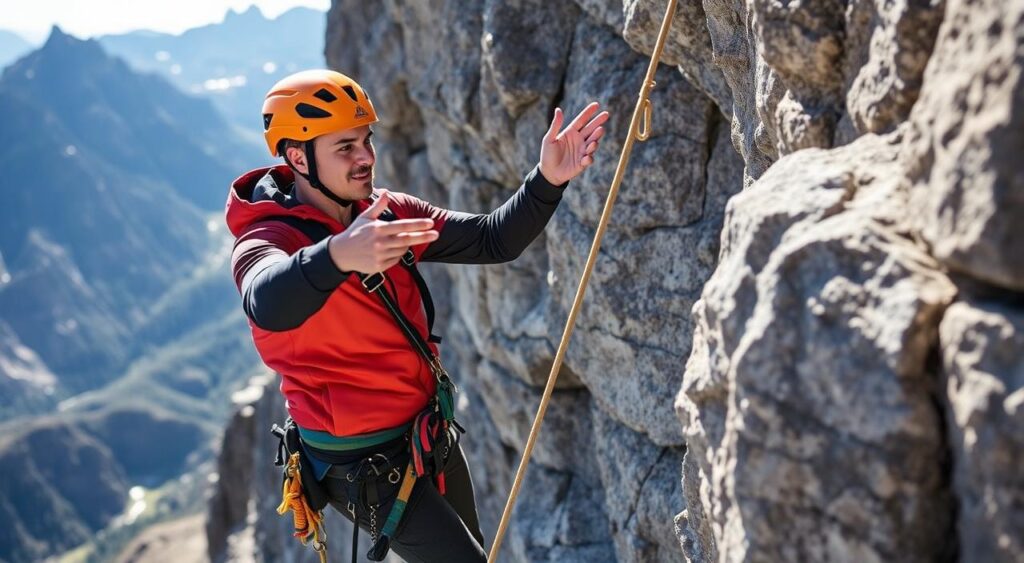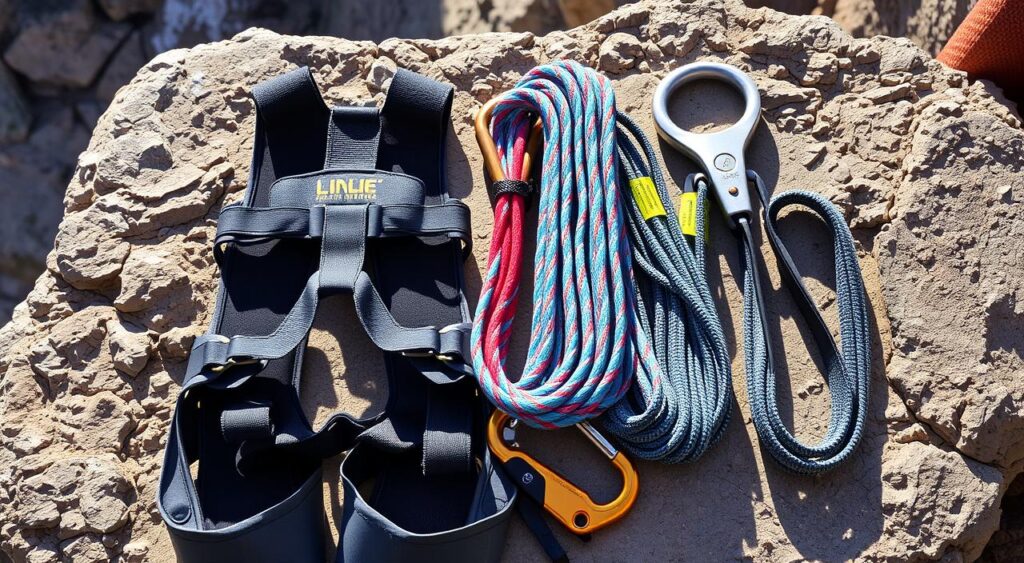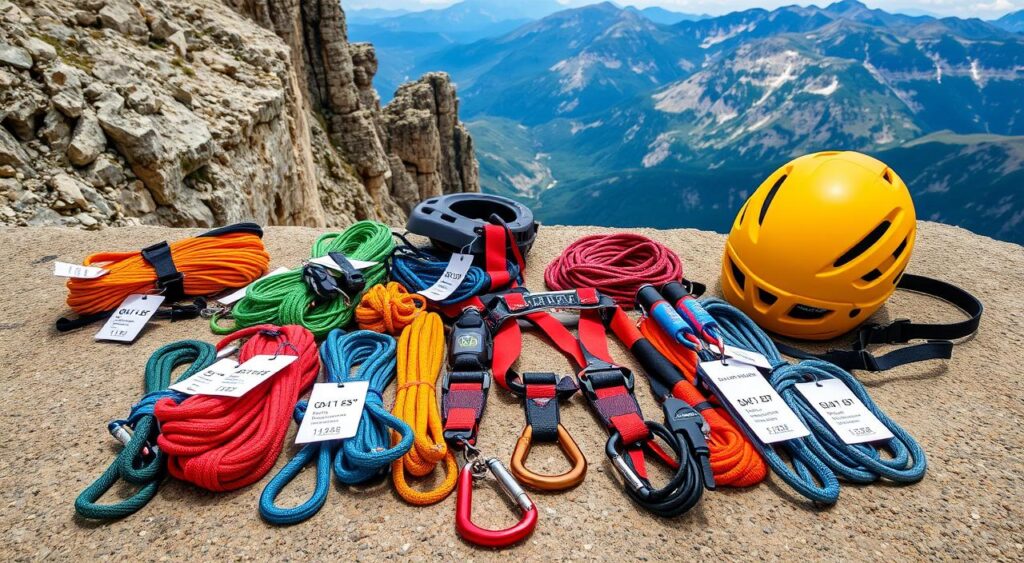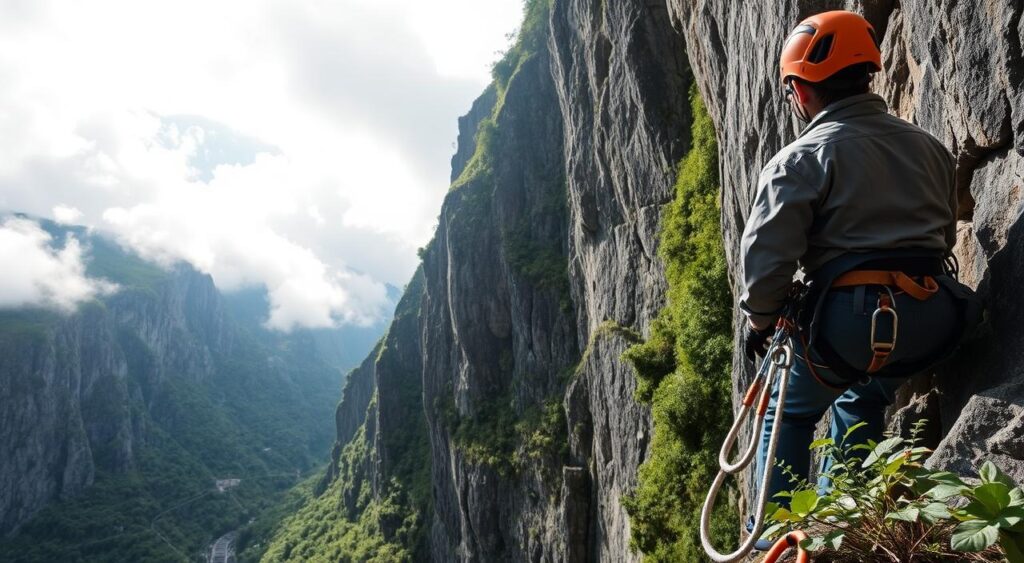Abseiling, known as rappelling. To descend a vertical surface, one needs climbing gear, ropes, and a harness. It started in the French Alps in the 1870s and has since become a well-liked adventure sport all around the world.
This article will guide you through the key aspects of abseiling. You will learn how to find qualified instructors and get the necessary supplies. You will also discover where this exhilarating vertical descent is most likely to occur.
Table of Contents
Introduction to Abseiling: The Art of Controlled Descent
Abseiling, also known as rappelling, is the thrilling art of sliding down a vertical surface. This could be a rugged cliff or a tall building. It was first used by French mountaineers in the 1870s. It gives you an unmatched rush as you slide down a vertical path.
Definition and Origin of Abseiling
The word “abseiling” comes from the German “abseilen,” which means “to rope down.” It was created as a safer way for climbers to go down after reaching the top. It’s a better and safer choice than old climbing methods.
Benefits and Thrill of Abseiling
Abseiling is not just fun; it also helps you grow personally and build team spirit. It makes you brave, helps you face your fears, and connects you with nature or cityscapes. It’s exciting for both seasoned adventurers and newcomers.
“Abseiling is not just an adrenaline-fueled activity – it’s a journey of self-discovery and personal empowerment.” – John Doe, Outdoor Adventure Guide
When you slide down a cliff or a tall building, you feel a great sense of achievement. You also grow personally. Abseiling mixes the thrill of climbing with the joy of learning a new skill.
Finding a Qualified Abseiling Instructor

Starting an abseiling adventure needs more than just excitement. It requires a qualified, certified guide. While online resources and books can help, a qualified abseiling instructor is key for safety, especially for beginners. They bring technical knowledge, teach proper techniques, and ensure you use the right equipment.
They also share important safety tips to boost your confidence.
Importance of Professional Guidance
Abseiling might look simple, but it’s a complex skill needing special training. A certified professional guides you through the sport’s details, from gear setup to safe descents. They spot and avoid dangers, keeping you safe during the adventure.
How to Locate Certified Instructors in Your Area
- Search online directories for abseiling instructors in your local area.
- Check with outdoor recreation organizations, such as the American Mountain Guides Association (AMGA) or the Professional Climbing Instructors Association (PCIA), to find certified guides in your region.
- Reach out to your local climbing or adventure sports community for recommendations on reputable abseiling instructors.
- Look for instructors who have received training and certifications from recognized industry organizations, ensuring they possess the necessary skills and qualifications.
Finding a qualified guide ensures your abseiling adventure is both exciting and safe. With a certified professional guiding you, you can enjoy the thrill of the descent without worrying about your safety.
Essential Abseiling Equipment

Before you start your vertical descent, you need the right gear. Key items include dynamic ropes, comfy harnesses, and helmets. Quality equipment is key for safety and a fun descent.
Ropes and Harnesses
Dynamic ropes made of high-tenacity nylon are best for abseiling. They absorb energy and reduce impact in case of a slip. These ropes cost hundreds of dollars.
A good harness spreads your weight evenly and lets you move freely. Sport harnesses with one buckle are simple. Universal harnesses with 3-4 buckles offer more adjustability.
Helmets, Carabiners, and Additional Gear
Climbing or rappelling helmets protect your head from falling objects. Carabiners connect your gear. You also need belay devices, gloves, and rappelling shoes.
Quality gear is crucial for safety and durability. A full setup costs $400 to $500 for basics. For pros, it can reach $1,000.
| Gear Item | Average Cost | Key Features |
|---|---|---|
| Dynamic Rope | $100+ | High-tenacity nylon, energy-absorbing |
| Harness | $65+ | Single, 3-4 buckle options for adjustability |
| Helmet | $90+ | Designed for climbing/rappelling |
| Carabiners | $15+ | Various locking mechanisms and types |
| Belay Device | $25+ | Tubular, assisted braking, figure 8 |
| Rappelling Shoes | $159+ | Specialized for climbing/abseiling |
Quality abseiling gear, ropes, harnesses, helmets, carabiners, and rappelling equipment are essential. They ensure your safety and make your abseiling experience successful.
Cost Considerations for Abseiling Gear

The cost of abseiling gear can change a lot. It depends on the brand, quality, and type of gear. The rope is usually the most expensive, costing between $100 to $300. Harnesses and accessory cords can add another $100 to $200 to your budget.
For the basic gear needed for abseiling, you might spend $400 to $500. But, if you’re a pro or have lots of experience, you might spend $750 to $1000. This is because you want the best quality for safety and durability.
It’s key to think about your budget but also to choose quality over cost for safety. Good abseiling gear means your equipment will last longer and work better. This makes your abseiling adventures safer and more fun.
“Abseiling is an exhilarating sport, but it’s essential to have the right rappelling equipment to ensure a safe and enjoyable adventure. Prioritize quality over cost, and you’ll be well on your way to conquering new heights.”
Here’s a rough guide to help you budget for your abseiling gear:
- Ropes: $100 to $300
- Harnesses: $50 to $70
- Carabiners and belay devices: $20 to $30 each
- Climbing helmets: $50 to $140
- Accessory cords and slings: $20 to $40
Choosing top-notch mountaineering gear is not just about safety. It also makes your abseiling adventures more exciting and memorable.
Safety First: Crucial Precautions for Abseiling

Abseiling is a thrilling way to descend vertically, but safety comes first. Before you start, make sure to do pre-descent checks and watch out for hazards around you.
Pre-Descent Checks and Hazard Awareness
First, check that your anchor point is secure and your harness fits right. Know the route you’ll take, looking out for loose rocks or uneven ground. Staying alert is key to abseiling safety.
Communication and Backup Systems
Talking clearly with your instructor or partner is vital. If you’re alone, tell someone where you are and when you’ll be back. Also, have a backup system, like a Prusik hitch, ready for any equipment problems.
By focusing on safety, you’ll enjoy your abseiling more and face fewer risks.
| Crucial Abseiling Safety Precautions |
|---|
|
Remember, risk management is crucial in abseiling. By taking these safety steps, you can dive into your vertical descent with confidence and enjoy the thrill.
Abseiling Site Selection
Choosing the right abseiling site is key for safety and fun. Make sure it’s legal for rappelling. Check the anchor points, bolts, or trees before you start. Also, pick a spot with no big obstacles or dangers below.
The path to get there and back should be easy. This makes setting up ropes and climbing back up simpler.
Factors to Consider for Ideal Locations
When looking for the best abseiling spot, remember these points:
- Legality and safety: Make sure it’s okay to abseil and check for dangers or rules.
- Anchor points: Look over the bolts, trees, or other anchors to make sure they’re strong and safe.
- Terrain and obstacles: Find a place with a clear path down, without any big dangers or blocks.
- Accessibility: Pick a spot that’s easy to get to and leave, for a smooth setup and return.
Popular Abseiling Destinations Worldwide
As you get better, you can try more challenging spots around the world. Some amazing places for abseiling include:
- The stunning cliffs of Yosemite National Park in the United States
- The breathtaking waterfalls of Kitulgala in Sri Lanka
- The rugged coastlines of the Amalfi Coast in Italy
- The towering glaciers of Jostedalsbreen National Park in Norway
Looking for the perfect abseiling spot can make your adventure even better. By thinking about the important factors and checking out famous places, you’ll have a fun and safe time.
Waterfall Abseiling: A Unique Thrill
For those who love a thrill, waterfall abseiling is a must-try. Kitulgala, a beautiful town in Sri Lanka, is the perfect spot for this adventure. Here, you can slide down a 105-foot-high waterfall, surrounded by stunning wilderness and natural beauty.
Waterfall abseiling mixes the excitement of a controlled drop with the beauty of a waterfall. It’s a thrilling activity that connects you deeply with nature. It’s become a favorite among adventure lovers, offering a unique experience unlike traditional canyoning or rock climbing.
Former Regimental Sergeant Major BRM Fernando, an instructor at Ravana Adventure Park, says foreigners often come for camping and adventure activities. Milinda Dinal from Sri Lanka had a memorable time at Ella Waterfall Abseiling. Stanislav Ploschansky from Poland also enjoyed a small waterfall abseiling adventure in December 2023.
With skilled guides, excellent safety gear, and a beautiful setting, waterfall abseiling in Kitulgala or Sipi Falls in Uganda is an unforgettable adventure. It’s perfect for those who want to explore the wilderness and push their limits.
“Visiting Ravana Adventure Park for waterfall abseiling provided a special experience,” shared Martina Göndöcs from Israel, echoing the sentiments of many adventure-seekers who have discovered the thrills of this captivating activity.
Mastering the Thrill of Abseiling
Abseiling is more than just a sport; it’s a path to learning and personal growth. As you get better, you’ll pick up new ways to control your descent. This boosts your confidence on the rope.
Learning to manage rope friction is key. You can wrap the rope around your body or use special devices. These methods help you control your speed and keep a steady pace. With each successful abseil, you’ll feel more confident and comfortable.
Abseiling also helps you face your fears and build courage. The thrill of descending vertically can change you. It makes you appreciate the beauty of the world around you. Whether you’re new or experienced, the feeling of accomplishment is unmatched.
As you improve your abseiling techniques, you’ll see your skills and confidence grow. Each successful abseil gives you the courage to try new things. See abseiling as a way to discover your inner adventurer and reach your full potential.
| Abseiling Skill Level | Recommended Techniques |
|---|---|
| Beginner |
|
| Intermediate |
|
| Advanced |
|
Abseiling is a journey that mixes physical skills, mental strength, and a connection with nature. Take on the challenge, face your fears, and let each descent take you to new heights of growth and adventure.
Conclusion
Abseiling is an exciting outdoor activity that combines adventure and personal growth. It lets you connect deeply with nature. To start, find a good instructor, buy quality gear, and always put safety first.
Abseiling takes you to amazing places like cliffs and waterfalls. It’s a thrilling way to explore the world. Whether you’re new or experienced, the feeling of success and excitement is unmatched.
Ready to try abseiling? It’s a chance to face your fears and enjoy the thrill of vertical descent. With the right help, equipment, and safety, you’ll discover a new side of outdoor fun and personal growth.
